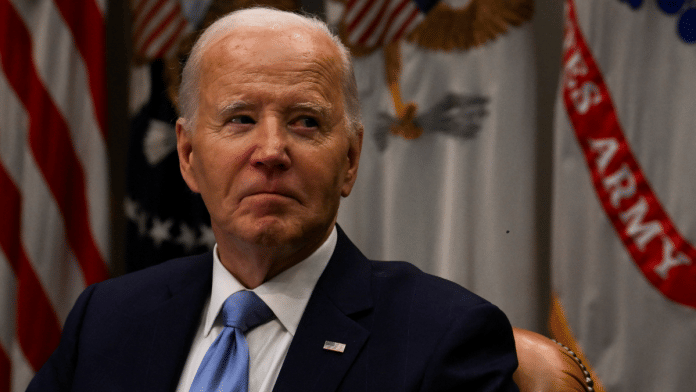Washington -The United States warned Iran that it would face severe consequences for its ballistic missile attack on Israel on Tuesday, saying the barrage marked a significant escalation but appeared to have been thwarted.
President Joe Biden expressed solid U.S. support for Israel and described Iran’s attack as ineffective. He said there was a discussion under way about how Israel would respond, and he planned to speak with Israeli Prime Minister Benjamin Netanyahu.
U.S. military forces in the region helped Israel and its air defenses defeat the attack and the Biden administration was consulting with Israeli officials on next steps, said U.S. national security adviser Jake Sullivan.
“This is a significant escalation by Iran, a significant event,” Sullivan told reporters at the White House. “We have made clear that there will be consequences, severe consequences, for this attack, and we will work with Israel to make that the case.”
Sullivan did not specify what those consequences might be, but he stopped short of urging restraint by Israel as the U.S. did in April when Iran carried out a drone and missile attack on Israel.
Biden was reported to have urged Netanyahu to “take the win” and refrain from retaliation after Iran’s April attack to avoid a wider regional war, given that Israel was largely unscathed.
Some analysts said Israel‘s response would likely be sharper this time, suggesting it could target Iran’s nuclear or oil facilities, while other experts said the U.S. was still expected to work behind the scenes to rein in Israel‘s response.
“The United States is fully, fully, fully supportive of Israel,” Biden later told reporters, while adding that it remains to be seen how Israel will respond.
Iran’s ballistic missile attack marks a steep escalation of tensions in the region, despite months of intense negotiations by the Biden administration and regular pledges that a ceasefire to end the Gaza conflict was imminent.
Biden, in the waning months of his term, already faces sharp criticism at home and abroad for U.S. military support of Israel, as does his Vice President and the Democrats’ presidential candidate Kamala Harris.
Former President Donald Trump issued a statement after Iran’s missile launch but didn’t directly address the strike.
“Iran has been exporting terror all over the world, and it’s been just unraveling. The whole Middle East has been unraveling,” said Trump, who will face Harris in the Nov. 5 election.
Harris said Iran was a dangerous and destabilizing force in the Middle East and Washington was committed to Israel‘s security.
US Navy Assists In Interception
Iran fired a salvo of missiles at Israel in retaliation for Israel‘s air and ground campaign against Tehran’s Hezbollah allies in Lebanon, and Israel vowed a “painful response” against its enemy.
Iran’s Revolutionary Guards vowed that if Israel struck back, Tehran’s response would be “more crushing and ruinous“.
Israel said it intercepted more than 180 missiles launched from Iran.
The Pentagon said two U.S. Navy destroyers fired about a dozen interceptors against Iranian missiles aimed at Israel.
Pentagon spokesperson Major General Patrick Ryder described the attack as significant and said the United States supported Israel‘s right to defend itself.
Ryder said the attack was about twice the scope of Iran’s April attack on Israel in terms of the number of ballistic missiles fired.
U.S. officials said they had no warning from the government of Iran that they were going to launch such an attack.
“No notice was given to the United States prior to our response; however, a serious warning was issued afterwards,” the Iranian mission said in a statement.
Israeli Major General Herzi Halevi said Israel would “choose when to collect the price, and prove our precise and surprising attack capabilities,” but did not provide any specifics.
Israel‘s retaliation on Iran in April was relatively mild and appeared calibrated to dial back risks of a major war between the arch-foes, even though it shattered a taboo of direct attacks that Tehran broke days earlier.
But analysts suggested Israel could hit back harder this time.
“Iran’s missile attack greenlights a counterstrike by Israel, potentially the final showdown blow that Prime Minister Netanyahu has been seeking for years,” said Laura Blumenfeld, a Middle East analyst at the Johns Hopkins School for Advanced International Studies in Washington.
(Reporting by Jeff Mason, Simon Lewis, Matt Spetalnick, Gabriella Borter, Phil Stewart and Trevor Hunnicutt; Writing by Matt Spetalnick; Editing by Don Durfee and Lisa Shumaker)
Disclaimer: This report is auto generated from the Reuters news service. ThePrint holds no responsibilty for its content.






